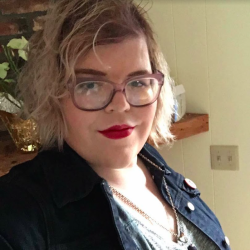6th ANNUAL NAPOMO 30/30/30 :: DAY 12 :: COLETTE ARRAND on TYLER VILE
[box][blockquote]HAPPY POETRY MONTH, FRIENDS AND COMRADES!
For this, the 6th Annual iteration of our beloved Poetry Month 30/30/30 series/tradition, I asked four poets (and previous participants) to guest-curate a week of entries, highlighting folks from their communities and the poets who’ve influenced their work.
I’m happy to introduce Janice Sapigao, Johnny Damm, Phillip Ammonds, and Stephen Ross, who have done an amazing job gathering people for this years series! We’re so excited to share this new crop of tributes with you. Hear more from our four guest editors in the introduction to this year’s series.
Hungry for more? there’s 150 previous entries from past years here! You should also check out Janice’s piece on Nayyirah Waheed, Johnny’s piece on Raymond Roussel, Phillip’s piece on Essex Hemphill, and Stephen’s piece on Ronald Johnson’s Ark, while you’re at it.
This is a peer-to-peer system of collective inspiration! No matriculation required.
Enjoy, and share widely.
– Lynne DeSilva-Johnson, Managing Editor/Series Curator [/blockquote][/box]
[line][line]
[box] WEEK TWO :: CURATED BY JOHNNY DAMM
PROPOSITION:
Every time a WRITER sees another WRITER on the street, WRITER # 1 yells the following question:
“Who are you reading?”
WRITER # 2 answers, also yelling, and at the first word, EVERYONE on the street stops walking, presses hands over mouths of cooing/crying babies, slams down car brakes and hurriedly unrolls windows.
EVERYONE listens, the world not allowed to resume until WRITER # 2 stops yelling.
SMALL REVISION:
Keep everything exactly the same, except make sure that WRITER # 2 is a talented writer, a fascinating writer, that WRITER # 2 is the present or future of what literature should be.
PROPOSITION:
Hush, y’all. Listen as Colette Arrand, Stephen Emmerson, Vanessa Angélica Villarreal, E.G. Cunningham, Douglas Luman, Travis Sharp, Raquel Salas Rivera, and Terri Witek yell into the street. [line]
Johnny Damm is the author of Science of Things Familiar (The Operating System, 2017) and three chapbooks, including Your Favorite Song (Essay Press, 2016), and The Domestic World: A Practical Guide (Little Red Leaves, forthcoming). His work has appeared in Poetry, Denver Quarterly, the Rumpus, Drunken Boat, and elsewhere. Visit him online at johnnydamm.com. [/box]
[line][line]
COLETTE ARRAND on TYLER VILE

[line][script_teaser]”…it’s the work of queer and trans artists, made where nobody is looking, that is most capable of sustaining a revolution.”[/script_teaser]
[line]
Before I read any of her poetry, Tyler Vile was a woman I met as a consequence of going to Brooklyn last year, where I participated in a fiction workshop for trans women. I’ve been a student and teacher of writing workshops of some kind for ten years now, but until that workshop I think I’d remained largely skeptical of such a space’s ability to change a person’s life, let alone their writing. A lot of my ideas of how literature should work as a community and as an enterprise were crystalized by this workshop, and when I think of the kind of people I want this community to center, I often think of Tyler Vile, whose work as a poet, activist, and performer push me to do just that.
Presses and journals don’t publish transgender writers enough. I know this because I’ve been hanging around indie lit for a decade or so and didn’t know Tyler was a poet until she started reading from Never Coming Home, her debut novel-in-verse, which was released by Topside Press in 2015, at The Bureau of General Services – Queer Division, which hosted two of the readings held in conjunction with the workshop Pulling back more, I had no idea how robust trans literature was until 2015, when I accidentally downloaded Casey Plett’s A Safe Girl to Love from The Pirate Bay, thinking it was a record by the kind of twee indie chanteuse has always been drawn to. I discover most of the literature I love by accident, but my ignorance to the stories, novels, and poems of other trans women is something I’ve been grappling with for a while now. Listening to Tyler read her poems, I knew immediately that she deserved to be in any major literary magazine she wanted to publish her work in. I’m still waiting for the editors of those magazines to wise up and seek her out.
[line]
[articlequote]It is necessary to experience Tyler Vile live, if you’re able. I’ve seen her read three times now, in Brooklyn and twice at AWP offsite events in Washington D.C., and Tyler is a goddamn dynamo. Her poems matter-of-factly describe the chaos of living as a disabled trans woman, the victim of abuse, and a punk in the city, but to see her in front of a crowd reading that work is to witness a woman in total command of that chaos, channeling emotions that’d consume anybody else whole into a power I rarely see in live readings.[/articlequote]
[line]
I believe that power also exists on the page. I’ve been privileged to publish excerpts from Tyler’s Hassidic Witch Murderer as the editor of The Wanderer. Hassidic Witch Murderer existed originally as an art collaboration between Vile and her sister, a project that literally fell apart with time. She ran a limited number of zines and sold them at NYC Feminist Zine Fest, and ultimately turned the project into an interactive digital zine via Twine – the excerpt at The Wanderer is the only piece of the project that someone in an MFA program might consider traditional.
[line]
But if we’re wondering at how to further poetry in ways that are accessible to people outside of academia, looking to how Vile and other trans artists, publishing digitally and physically on their own terms, do it. Vile’s poems have recently appeared in Femmescapes, sharing space with other writers I admire and don’t see enough in the world, like Joss Barton, who was also at that Brooklyn workshop, KOKUMO, and Raquel Salas Rivera. That the zine ends with a meme by the Yerbamala Collective that reads “CALLING ALL VAMPIRE FEMMES TO FEAST ON FACIST BLOOD,” which, taped to telephone poles, has gone viral online feels profound to me, as it’s the work of queer and trans artists, made where nobody is looking, that is most capable of sustaining a revolution. Reading from her battered copy of Never Coming Home in a room packed well beyond capacity, Tyler shows us not only that we can feast, but that doing so is our obligation.
[line][line]
[textwrap_image align=”left”] [/textwrap_image] Colette Arrand is a student at the University of Georgia, studying English Literature. She is the author of Hold Me Gorilla Monsoon (Opo Books & Objects, 2017). She is the founding editor of The Wanderer and the non-fiction editor of Heavy Feather Review. She currently lives in Athens, GA, where she runs Fear of a Ghost Planet, a zine press and distro.
[/textwrap_image] Colette Arrand is a student at the University of Georgia, studying English Literature. She is the author of Hold Me Gorilla Monsoon (Opo Books & Objects, 2017). She is the founding editor of The Wanderer and the non-fiction editor of Heavy Feather Review. She currently lives in Athens, GA, where she runs Fear of a Ghost Planet, a zine press and distro.
[line]
[h5]Like what you see? Enter your email below to get updates on events, publications, and original content like this from The Operating System community in the field below.[/h5]
[mailchimp_subscribe list=”list-id-here”]
[line]
[recent_post_thumbs border=”yes”]


